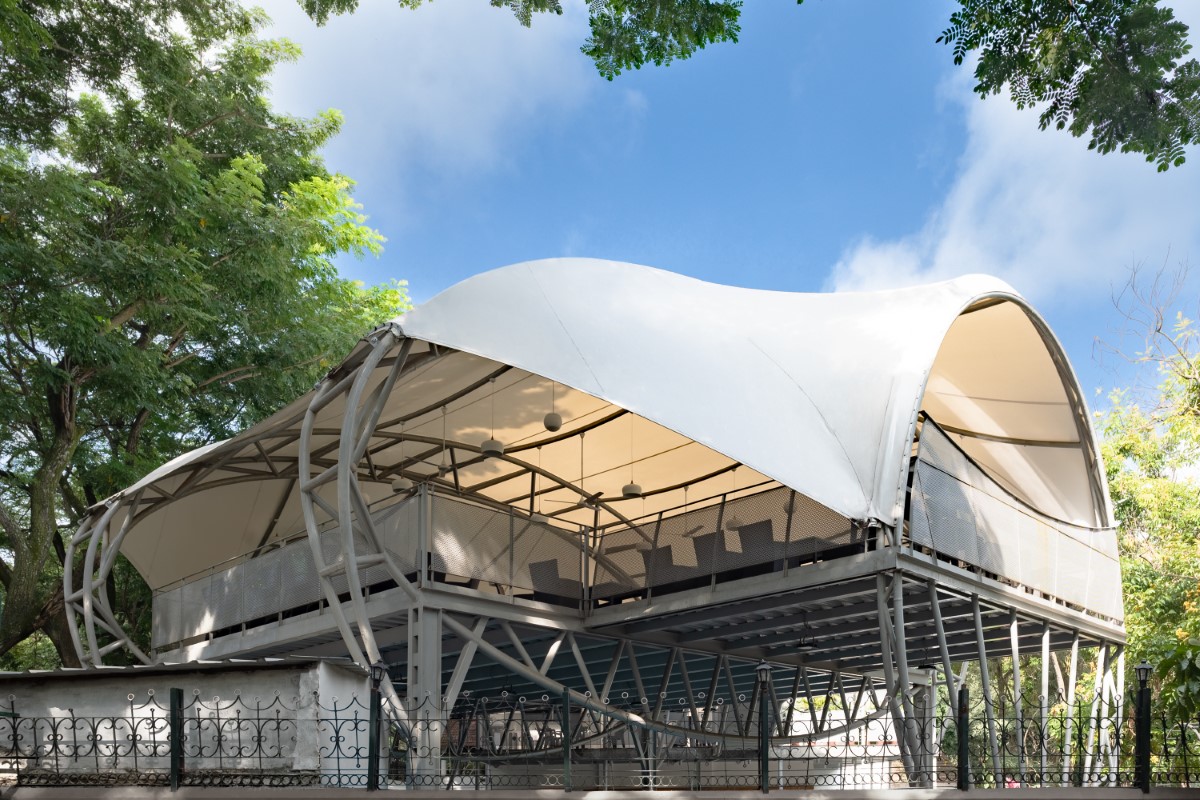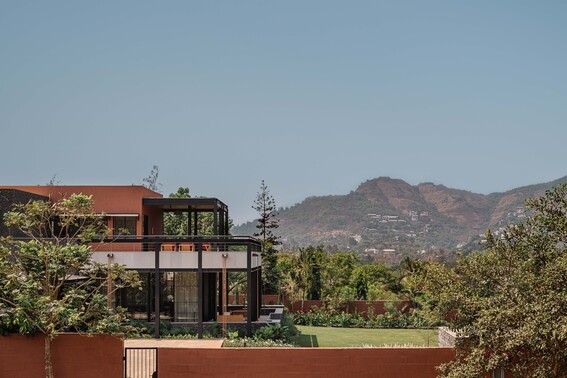Sitting on a tight plot in the heart of Kolhapur is the Brick Box, conceptualised by Ar. Dhanesh Gandhi (Dhanesh Gandhi Architects). A four-storey family home spanning over 2500 sq. ft, this residence more than rises above its challenges. The plot was a linear, narrow rectangle of 16.5 ft x 40 ft, posing to be the main challenge for this project. Flanked by homes on either side, the northern and southern walls were designed to be dead walls, with the scope for light and ventilation limited to the east and west. Given that the western facade was the front-facing side, natural light had to be strategically drawn into the interiors while avoiding the glare of the west. Thus emerged the frontal brick-clad wall which renders this residence its name.
The Brick Box is conceived as a homogenous mass into which voids have been intentionally carved out to cater to the functions of the home. Being a linear rectangle, the architect devised the plan to harness light and ventilation in the vertical dimension, along with the horizontal. To achieve this, the staircase landing is pulled in on both ends, creating a seamless passage of light. Skylights on either end bring ample light into the space, casting dynamic shadows on the brick interiors. The skylights are mounted on top of two vertical windows that enable a stack effect in this home. Given that the staircase is centrally placed, it draws out the hot air from the entire residence, maintaining a cool, rejuvenating ambience.
One enters the house through the front gate done in sleek metal slats. Right next to it, is the Tulshi Katta, placed in front of a stone wall, complementing the sleekness of metal. The name Riddhi can be seen on this wall, surrounded by four traditional projections made for diyas and garlands. Inside is the parking area that leads to the main staircase, and further down, to the meditation room.
The first floor is the main space comprising the minimalistic living room, dining and kitchen. Replete with custom-built furniture in African-Ghana Sagwan wood, the living room offers a pleasant, homely ambience. The earthy tones of mushroom stone flooring balance out the texture of the wood. The walls are painted in a satin matte paint, to create a subtle and non-intrusive background for the main elements within the room. Suspended indirect lighting illuminates the room at night, casting a luminous glow on the wooden furniture. The western wall is punctuated by wooden windows only on the extreme ends so as to keep the heat and glare of the sun away. Since the site faces the main street, this also helps in adding a sense of privacy to the house. A brass-finished fan ties into the cohesive palette of the living area.
The second floor houses two bedrooms, each showcasing the overall essentialist approach of the house. Though modern and clean in its form, each furniture piece pays homage to the Indian traditional aesthetic through its elements. The posts of the bed, for example, feature a pyramidal top that is derived from the Shikhar and Kalash seen on top of Indian temples. In the west-facing bedroom, the main wall carries its brick finish into the interiors, giving it a quaint charm. A fabric-laminated wardrobe and a petite writing desk complete the room. A longitudinal niche has been carved out over the desk that provides cove lighting at night time. The bedrooms feature nightstands which are designed on the concept of ‘mass and void’, mirroring the concept of the house, even in the smaller details.
On the third floor are the final bedroom and the utility area, placed on either side of the staircase. All the rooms in the house have been optimised for space and utility, despite the challenges of the plot. Every bedroom is ensuite and has been planned with spaciousness and relaxation in mind. The fourth and the uppermost floor open out into the eastern and western sides by means of a balcony and a terrace, respectively.
From the eastern balcony, one can see the Shikhar of the Mahalakshmi Temple, which gives this balcony its very purpose. On the other side, to the west, Rankala Lake can be viewed from the terrace. The terrace is decked out with inbuilt stone seating to create a space for interaction and engagement.


Two pivot windows, the architect’s signature, punctuate the walls between the staircase and the terraces.
To step away from the bulkiness of the entire mass, the western terrace is framed in a metal rectangle, adding character to the main facade. The Brick Box has been painted in a neutral, earthy brown on the exterior to highlight the primary brick facade. Windows of the living room, bedrooms and bathroom add a sense of modularity to the facade. The brick courses change in tandem with the sill and lintel levels of these windows, making the onlooker engage with its simplicity.
The Brick Box has been conceptualised as a creative solution to a tight-knit, box-like space. What emerges as the final product is a utilitarian home supplemented by traditional minimalist aesthetics. Rather than pushing against the restrictions of the site, the project transforms them into the characteristic feature of this family home.
Drawings
Project Facts
- Project name: The Brick Box Project
- Location: Shivaji Peth, Kolhapur, Maharashtra, India.
- Site area: 600 sq. ft.
- Built-up area: 2750 sq. ft.
- Architects: Dhanesh Gandhi Architects
- Design Team: Ar.Dhanesh Gandhi, Sachin Lad
- Photography Credits: Pranit Bora
- Collaborators: Ar.Dhanesh Gandhi & ID.Tanushree Oswal
- Interior design: Ar.Dhanesh Gandhi & Sachin Lad
- Design year: 2020
- Completion year: 2022
- Landscape: Ar.Dhanesh Gandhi
- Civil engineer: Sachin Lad
- Structural engineer: Er. Nirag Parmar
- Lighting: Ar.Dhanesh Gandhi & Sachin Lad
- Construction: Sachin Lad
- Supervision: Sachin Lad
- Typology: Residencial
Materials and Specifications
- Flooring: Natural stone (Mushroom & Kota) & wooden laminated flooring
- External material: Texture finish
- Main Door: Wooden door
- Windows: Wooden & Aluminium windows



































